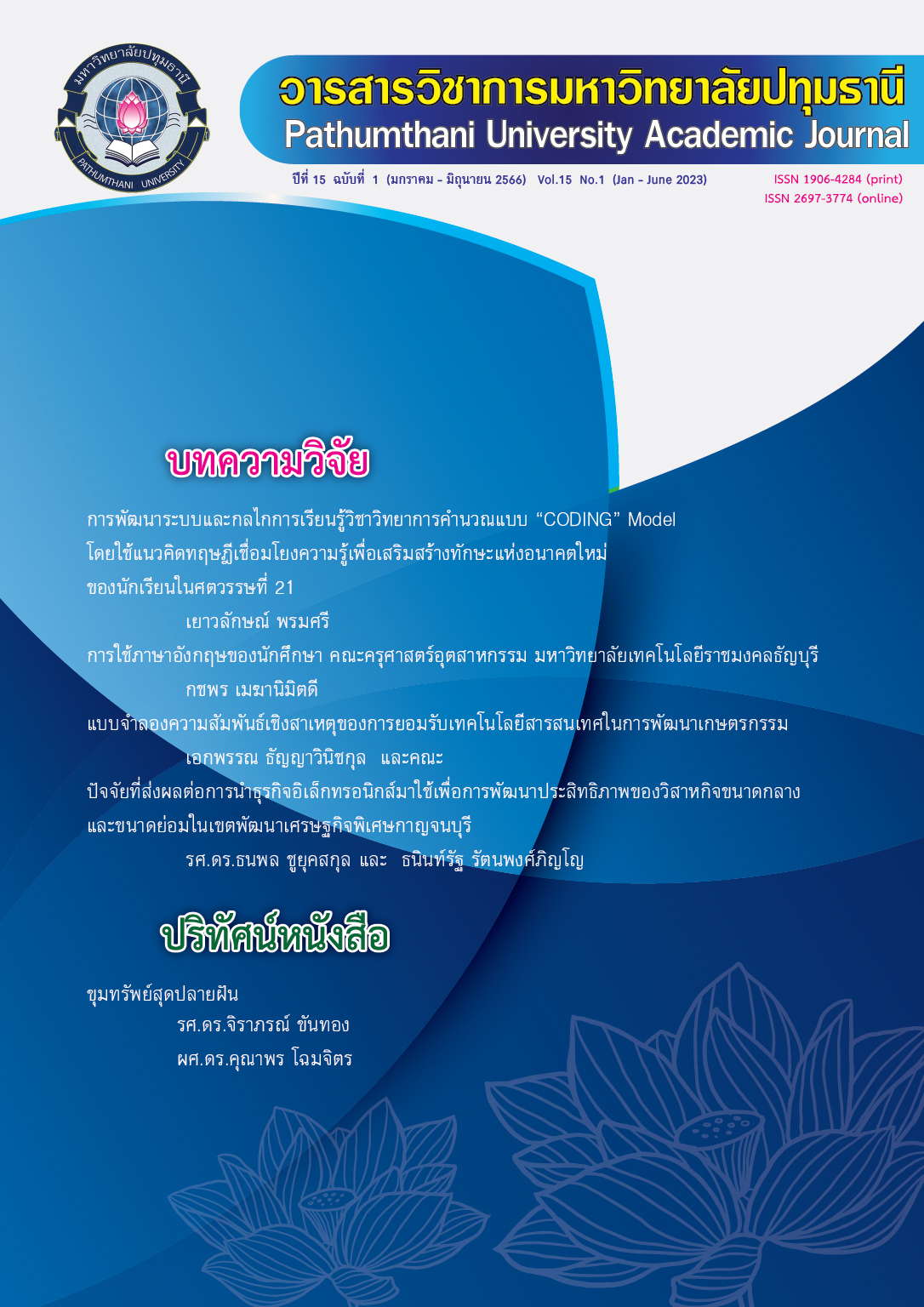ENGLISH USAGE: FACULTY OF TECHNICAL EDUCATION, RAJAMANGALA UNIVERSITY OF TECHNOLOGY THANYABURI
Keywords:
English usage , Faculty of Technical Education , StudentsAbstract
The research aimed to: 1) study the current and desirable characteristics of English usage and 2) study the guidelines for English usage development of students of Faculty of Technical Education, Rajamangala University of Technology Thanyaburi. The sample group consisted of 322 Bachelor’s degree students of Faculty of Technical Education, Rajamangala University of Technology Thanyaburi by Proportional Stratified Random Sampling. The instruments used for collecting data were questionnaire, structured interview, statistical analysis by frequency, percentage, mean, Standard Deviation, Priority Needs Index, and data analysis by content analysis.
The findings were revealed as follows:
- The current characteristics of English usage as perceived by students overall were at an average. The aspect of four English skills, it was found that the current characteristics average respectively was reading, speaking, writing and listening. The desirable characteristic overall was at a high level. The aspect of four English skills, it was found that the desirable characteristic average respectively was speaking, listening, writing and reading. The needs of four English skills were at high level. The priority needs index of four English skills was listening, speaking, writing and reading respectively.
- The guidelines for the English usage development of students in four English skills. The faculty provided the activities to develop students' English skills in classroom through greetings, lectures, teaching materials, exercises, exams, and projects in English regularly. The faculty provided the various faculty media, an English-language club with native speakers to serve as the English club officer, English medias, English language training courses, English language competition activities such as Q&A, presentations, reading and writing essays, etc.
References
กฤษณะ โฆษชุณหนันท์. (2559). “การใช้ภาษาอังกฤษเพื่อการสื่อสารของวิศวกรไทย: กรณีศึกษาบริษัทญี่ปุ่นในนิคมอุตสาหกรรมอมตะนคร”. สุทธิปริทัศน์ ปีที่ 30 ฉบับที่ 9.
กองนโยบายและแผน. (2564). [ออนไลน์] เข้าถึงได้จาก https://shorturl.asia/392tY. นโยบายมหาวิทยาลัยเทคโนโลยีราชมงคลธัญบุรี พ.ศ. 2563=2580.
ชัญญนิษฐ์ อินทร. (2563). “ปัญหาและความจำเป็นด้านการพัฒนาทักษะการสื่อสารภาษาอังกฤษในการทำงานของพนักงานธนาคารแห่งหนึ่ง ในเขตเมืองพัทยา”. วารสารวิชาการมหาวิทยาลัยปทุมธานี. ปีที่ 12 ฉบับที่ 2.
บุญมี พันธุ์ไทย. (2545). ระเบียบวิธีวิจัยการศึกษาเบื้องต้น. (พิมพ์ครั้งที่ 2). มหาวิทยาลัยรามคำแหง : สำนักพิมพ์มหาวิทยาลัยรามคำแหง.
ปรีชา ศรีเรืองฤทธิ์ และคนอื่น ๆ. (2562). “แนวทางการพัฒนาทักษะภาษาอังกฤษในบริบทของประเทศไทย. การประชุมวิชาการระดับชาติ วิทยาลัยนครราชสีมา ครั้งที่ 6 ประจำปีการ 2562.
พรชิตา สุวรรณแม และคนอื่น ๆ. (2564). การพัฒนาหนังสืออิเล็กทรอนิกส์ เรื่อง เทคนิคการสอบโทอิค ปี 2564. โครงงานสหกิจศึกษา คณะศิลปศาสตร์ มหาวิทยาลัยเทคโนโลยีราชมงคลธัญบุรี.
พิมลพรรณ เพชรสมบัติ. (2560). ทักษะการบริหารของผู้บริหารมหาวิทยาลัยเทคโนโลยีราชมงคลธัญบุรี. มหาวิทยาลัยเทคโนโลยีราชมงคลธัญบุรี จังหวัดปทุมธานี.
ศันสนีย์ บุญนิธิประเสริฐ และ สืบสกุล นรินทรางกูร ณ อยุธยา. (2562). “ความต้องการจำเป็นของการพัฒนาสมรรถนะด้านการใช้ภาษาอังกฤษในการสื่อสารของพนักงานมหาวิทยาลัยสายสนับสนุน ของจุฬาลงกรณ์มหาวิทยาลัย”. วารสารอิเล็กทรอนิกส์ทางการศึกษา คณะครุศาสตร์ จุฬาลงกรณ์มหาวิทยาลัย. ปีที่ 14 ฉบับที่ 2.
สุวิมล ว่องวาณิช. (2550). การวิจัยประเมินความต้องการจำเป็น. กรุงเทพมหานคร : สำนักพิมพ์แห่งจุฬาลงกรณ์มหาวิทยาลัย.
สำนักส่งเสริมวิชาการและงานทะเบียน. (2563). รายงานการสำเร็จการศึกษาของนักศึกษา ปีการศึกษา 2563. มหาวิทยาลัยเทคโนโลยีราชมงคลธัญบุรี.
Cronbach, Lee. J. (1978). Essential of Psychological Testing. New York: Herper & Row Publishers.
Krejcie, R. V., & Morgan, D.W. (1970). “Determining Sample Size for Research Activities”. Education and Psychological Measurement. Vol 30 No. 3. Pp 607-610.
Likert, R. (1967). The Human Organization: Its Management and Value. New York: McGraw-Hill
Downloads
Published
How to Cite
Issue
Section
License
Copyright (c) 2023 กชพร เมฆานิมิตดี

This work is licensed under a Creative Commons Attribution-NonCommercial-NoDerivatives 4.0 International License.
บทความที่ได้รับการตีพิมพ์เป็นลิขสิทธิ์ของวารสารมหาวิทยาลัยปทุมธานี
ข้อความที่ปรากฎในบทความแต่ละเรื่อง เป็นความคิดเห็นส่วนตัวของผู้เขียน กองบรรณาธิการไม่จำเป็นต้องเห็นด้วยเสมอไป และไม่มีส่วนรับผิดชอบใด ๆ ถือเป็นความรับผิดชอบของผู้เขียนแต่เพียงผู้เดียว



